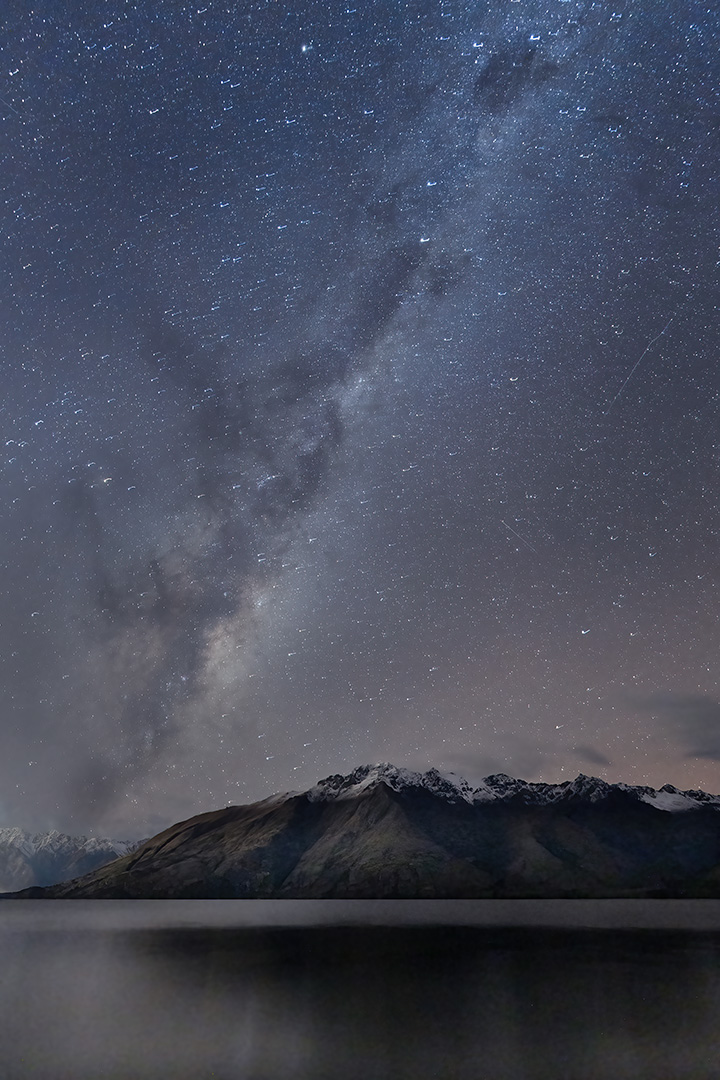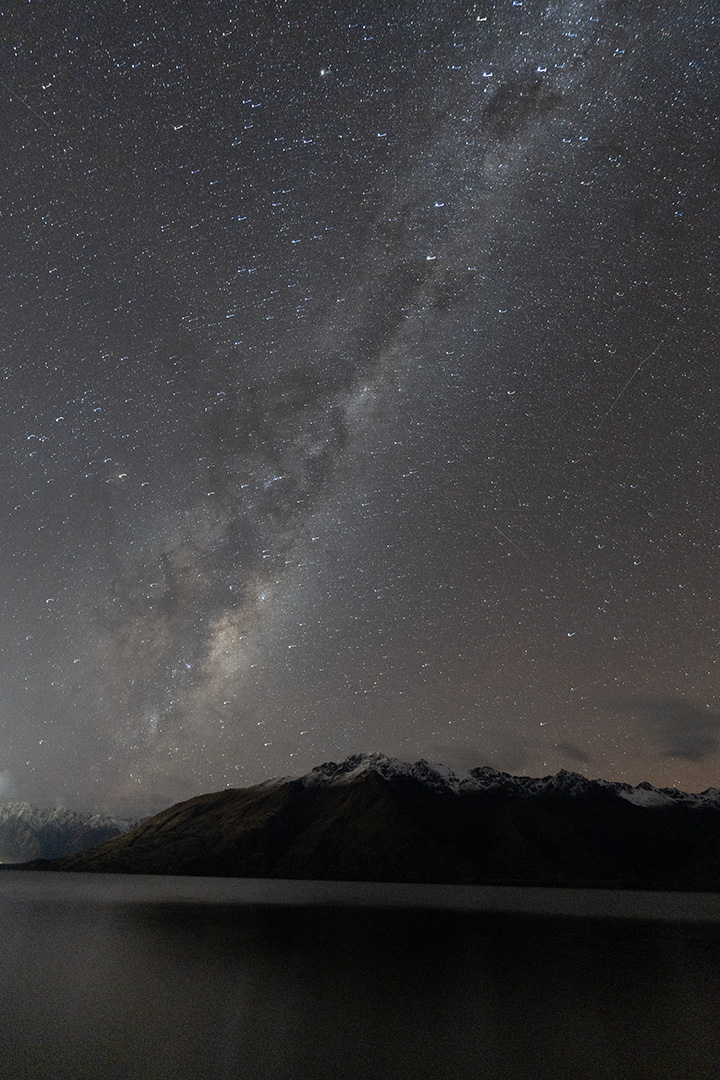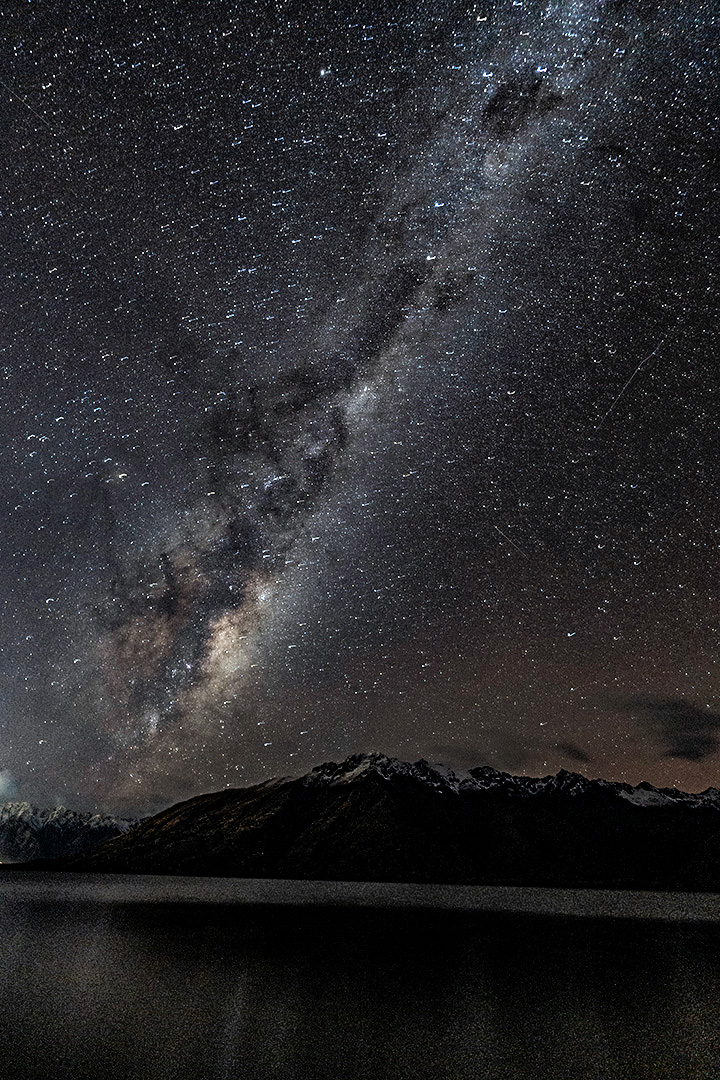Kathryn Bundy
About the Image(s)
On a recent trip to New Zealand, I had the chance to photograph the Milky Way for the first time. Fortunately, due to the time difference (it was winter there) the sun set at
5:30pm so I didn’t have to stay up late to capture the night sky.
Post processing included darkening the sky a bit, de-noise and lightening the foreground and hills.
Camera: Sony 6700
Lens: 11mm (16mm)
Settings: 11mm, f/1.8, ISO 3200
Manual
Tripod
10 comments posted
Very nice processing. I particularly like the way you handled the land, both with respect to composition and in post. It is a pity that you didn't try using a higher ISO and a much shorter exposure as the star trails will be visible in a larger print. The trails themselves suggest that perhaps your image stabilization was on when you took the image. Posted: 07/07/2025 19:03:30
Thank you! I did take some at ISO 6400 but haven't gotten to them yet in processing. This one was done in a bit of a hurry as I was late getting this month's image to Brenda - who I'm sure would have waited another day but... I do think image stabilization was on as that is what the workshop leader said to do and as this was my first attempt at Milky Way I followed his recommendations. With that said there is another opportunity at the end of this month here in Idaho for good Milky Way photography so will try again with your suggestions.
When I get to the other images with higher ISO I will post an update. Posted: 07/07/2025 19:53:50
When I get to the other images with higher ISO I will post an update. Posted: 07/07/2025 19:53:50
The manual for my "old" Canon T5i suggested having image stabilization off when using a tripod, but the manual for my newer Canon R5 says that you can leave stabilization on when using a tripod because the camera can detect the absence of motion and will shut the sstabilization off in that case. I suspect that your 6700 may do better with stabilization off when you use a tripod. Posted: 07/07/2025 20:47:06
Thanks. Will try it off and on at the next shoot.
Posted: 07/07/2025 21:10:12
Posted: 07/07/2025 21:10:12
Very nice! FYI. The latest version of PS has pretty good de-noise in Camera Raw and comes with various color/BW profiles too. Posted: 07/11/2025 19:31:19
I have never seen a clear sky from the Southern Hemisphere so I'm jealous. I love your image!!! I've done quite a few milky way photographs in the past myself. A few things you need to watch out for is to be sure to capture the color of the stars. Even though these images are basically dark the points of light which are the stars can be blown out. I notice that all your stars are white so I suspect you should have reduced the highlights in post processing. Anyway here is an edit I have done mostly using the clarify and dehaze functions in camera RAW. Posted: 07/13/2025 15:41:30
Thanks Ed. I've taken your suggestions and applied to my photo. It's not quite the same as yours but the stars are easier to see and I was able to keep the sky reflecting the setting sun. We did go out for a full nighttime shot but the sky wasn't clear that night. Hoping the sky at the end of the month here in Idaho is clear so I can try again. Posted: 07/13/2025 17:27:35
Kathryn, Nice start on your Milky Way Photography! Your composition is great and you've gotten good advice from Jean, Robert and Ed. Night photography is tough but really rewarding, so I know you'll love it! And your higher ISO images might give you a perfect image!
You don't say how long your shutter was open and if you used a cable release. Touching the camera to take a long exposure can be all you need to get the blurriness that is hurting your well-composed image. A little wind will do it too. And I found that my Arca plate will slip a bit when aimed up at the sky--I finally glued Lock-tite on my Arca to the camera base to stop that "slip" when I aimed my camera up in the air for long exposures.
There is so much to night photography--you might find the Erik Kuna classes at KelbyOne helpful. He's the NASA and Space X photographer. He covers how to shoot it, how to stack images and how to process the image or images. It's $19.99 a month and you can quit right after you've taken his classes. It will get you ready for your Idaho adventure! If you do decide to take his online classes, let me know, and I'll walk you through which classes to take. There is free stuff online, but most make it more complicated and give you bad advice. KelbyOne.com
BTW, I've NEVER heard anyone say to leave your stabilizer on when shooting on a tripod. With my Canon gear, it will RUIN my shoot, whether its night photography or a sunset landscape. I don't know about Sony gear, but really worth researching.
Posted: 07/14/2025 19:20:13
You don't say how long your shutter was open and if you used a cable release. Touching the camera to take a long exposure can be all you need to get the blurriness that is hurting your well-composed image. A little wind will do it too. And I found that my Arca plate will slip a bit when aimed up at the sky--I finally glued Lock-tite on my Arca to the camera base to stop that "slip" when I aimed my camera up in the air for long exposures.
There is so much to night photography--you might find the Erik Kuna classes at KelbyOne helpful. He's the NASA and Space X photographer. He covers how to shoot it, how to stack images and how to process the image or images. It's $19.99 a month and you can quit right after you've taken his classes. It will get you ready for your Idaho adventure! If you do decide to take his online classes, let me know, and I'll walk you through which classes to take. There is free stuff online, but most make it more complicated and give you bad advice. KelbyOne.com
BTW, I've NEVER heard anyone say to leave your stabilizer on when shooting on a tripod. With my Canon gear, it will RUIN my shoot, whether its night photography or a sunset landscape. I don't know about Sony gear, but really worth researching.
Posted: 07/14/2025 19:20:13
Brenda - Thanks for the info. I checked out Eric's courses and will be taking them. The remote release I had didn't work with my camera so had to press the button. I did set the timer to a 2 second delay so thought that might have worked but apparently not. The instructor may not have heard me or thought I said the stabilizer was off even though it was on - most of the work I do is handheld. I'm really not much of a night photographer so this is all new to me. Posted: 07/20/2025 21:45:13
"This is beautifully captured and well processed. I haven't had the chance to photograph or even witness the Milky Way myself, so I may not be the best judge - but your photo looks fantastic. Really liked it, thanks for sharing!" Posted: 07/16/2025 01:33:09


